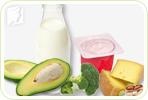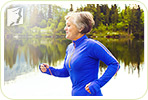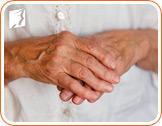
Osteoporosis, or "porous bone", is the loss of bone density and thinning of bone tissue with age. Women experience osteoporosis during menopause because low hormone levels affect bone health. Estrogen is essential to maintaining bone health because it contains anti-oxidizing properties that help protect bones and allow them to absorb calcium. If your body is no longer producing enough estrogen, your bones will become more vulnerable to fractures.
Long before you reach menopause, and during the transition, maintaining bone density is crucial. One of the easiest ways to fight bone loss and menopausal osteoporosis is to get plenty of calcium. There are ways to increase bone mass and maintain overall health through obtaining proper nutrients.
Essential Needs for Stronger Bones
Milk
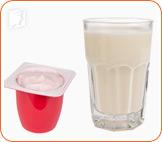
One of the most known sources of calcium, drinking milk is beneficial for bone health. Not only does milk have much-needed calcium, it's a vital source of protein and vitamins D and K, which are all needed to prevent osteoporosis.
Yogurt
Milk is not the only source of calcium available. In fact, yogurt is another healthy alternative. If you are lactose intolerant, look for calcium fortified alternatives, like soy yogurt.
Tofu

Tofu is packed full of calcium. Just 240 ml of tofu can contain 258 mg of calcium. Be aware though, tofu is made from soybeans and soy is a natural estrogen stimulant. Not everyone needs excessive amounts of estrogen, so consult your doctor before drastically increasing your consumption of tofu and other soy products.
Sesame seeds
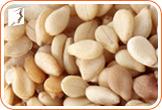
Sesame seeds are rich in calcium, magnesium, vitamin B1, zinc, and dietary fiber. Not only do they help improve bone health, but they also provide relief from migraines, lower high blood pressure, and can reduce the risk of cancer. If you aren't planning a visit to a ballpark anytime soon, or lack the patience for individual shucking, sesame seed butter may be a better option. You can use it just as you would peanut butter.
Sunshine

Although not a food source, sun is just as important to maintaining bone health. Getting just a few hours of sunshine each week will help your body produce vitamin D, which necessary for the proper absorption of calcium. Just be sure to always wear sunscreen.
More Information about Calcium and Osteoporosis
Ask your doctor about taking a bone density test to evaluate your bone health and your risk for developing osteoporosis. Osteoporosis is often known as a silent disease among menopausal women because there are virtually no symptoms until there's a broken bone. Exercise and a healthy diet are the best preventative measures you can take. Follow the link below to read more about the different osteoporosis treatments.
Sources
- American Physical Therapy Association.(n.d)."What You Need to Know about Osteoporosis.Retrieved from www.apta.org.
- Cleveland Clinic. (n.d)."Menopause and Osteoporposis." Retrieved from http://my.clevelandclinic.org.
- National Osteoporosis Foundation. (n.d)."Prevention: Who's at Risk." National Osteoporosis Foundation. Retrieved from www.not.org.
- New York State Department of Health.(n.d)."Calcium and Healthy Bones." Retrieved from www.health.state.ny.us.


